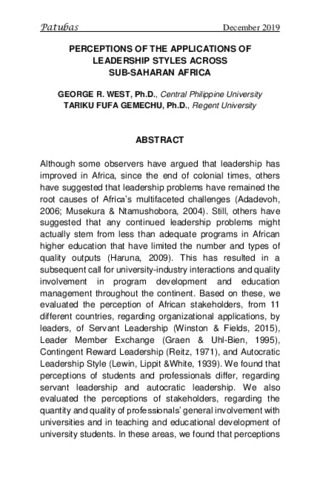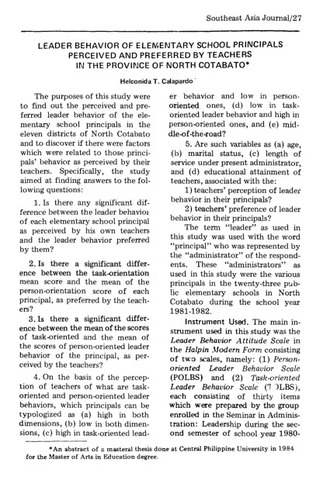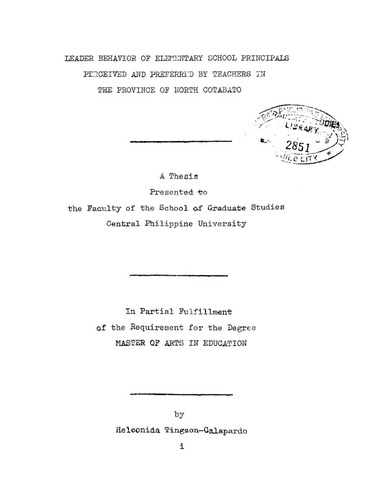Perceptions of the applications of leadership styles across Sub-Saharan Africa
| dc.contributor.author | West, George R. | |
| dc.contributor.author | Gemechu, Tariku Fufa | |
| dc.date.accessioned | 2021-11-16T23:59:22Z | |
| dc.date.available | 2021-11-16T23:59:22Z | |
| dc.date.issued | 2019-12 | |
| dc.identifier.citation | West, G. R. & Gemechu, T. F. (2019). Perceptions of the applications of leadership styles across Sub-Saharan Africa. Patubas, 14(1), 1-31. | en_US |
| dc.identifier.issn | 1908-515X | |
| dc.identifier.uri | https://hdl.handle.net/20.500.12852/1689 | |
| dc.description | Journal article | en_US |
| dc.description.abstract | Although some observers have argued that leadership has improved in Africa, since the end of colonial times, others have suggested that leadership problems have remained the root causes of Africa’s multifaceted challenges (Adadevoh, 2006; Musekura & Ntamushobora, 2004). Still, others have suggested that any continued leadership problems might actually stem from less than adequate programs in African higher education that have limited the number and types of quality outputs (Haruna, 2009). This has resulted in a subsequent call for university-industry interactions and quality involvement in program development and education management throughout the continent. Based on these, we evaluated the perception of African stakeholders, from 11 different countries, regarding organizational applications, by leaders, of Servant Leadership (Winston & Fields, 2015), Leader Member Exchange (Graen & Uhl-Bien, 1995), Contingent Reward Leadership (Reitz, 1971), and Autocratic Leadership Style (Lewin, Lippit &White, 1939). We found that perceptions of students and professionals differ, regarding servant leadership and autocratic leadership. We also evaluated the perceptions of stakeholders, regarding the quantity and quality of professionals’ general involvement with universities and in teaching and educational development of university students. In these areas, we found that perceptions of students and professionals differ, regarding professionals’ general involvement with universities. | en_US |
| dc.language.iso | en | en_US |
| dc.publisher | Central Philippine University | en_US |
| dc.subject.lcsh | Leadership | en_US |
| dc.subject.lcsh | Educational leadership | en_US |
| dc.subject.lcsh | Universities and colleges | en_US |
| dc.subject.lcsh | Africa | en_US |
| dc.subject.lcsh | Sub-Saharan Africa | en_US |
| dc.subject.lcsh | Servant leadership | en_US |
| dc.subject.lcsh | Interorganizational relations | en_US |
| dc.subject.lcsh | Institutional cooperation | en_US |
| dc.title | Perceptions of the applications of leadership styles across Sub-Saharan Africa | en_US |
| dc.type | Article | en_US |
| dc.citation.firstpage | 1 | en_US |
| dc.citation.lastpage | 31 | en_US |
| dc.citation.journaltitle | Patubas | en_US |
| dc.citation.volume | 14 | en_US |
| dc.citation.issue | 1 | en_US |
| local.subject | African management | en_US |
| local.subject | Servant leadership | en_US |
| local.subject | LMX | en_US |
| local.subject | Contingent reward | en_US |
| local.subject | Autocratic leadership | en_US |
| local.subject | African leadership | en_US |
Fichier(s) constituant ce document
Ce document figure dans la(les) collection(s) suivante(s)
-
Patubas [110]
Patubas is a refereed research journal of Central Philippine University.





